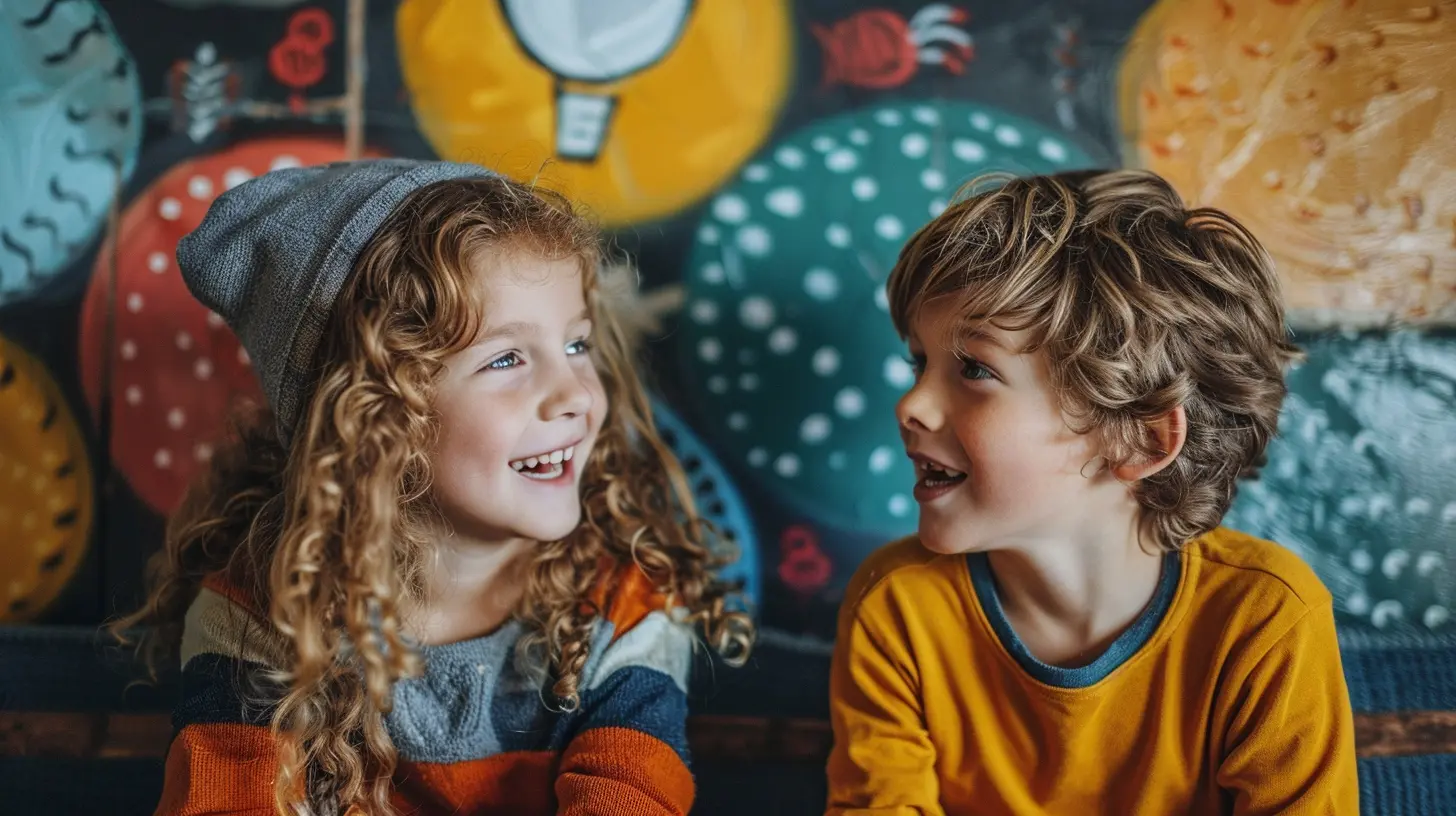The Impact of Parent-Child Conversations on Language and Learning
8 June 2025
Ever wonder how much your everyday chats with your child truly shape their world? You've probably had a hundred little conversations just today—asking about their dreams, explaining why the sky is blue, laughing about a silly dog video. But there’s something wild, almost magical, happening beneath the surface of those casual talks. Your words, tone, and timing are quietly building something profound: your child’s capacity to think, speak, and understand the world.
Welcome to the deep, mysterious, and quite frankly, life-changing impact of parent-child conversations on language and learning.

Why Talking Matters More Than You Think
Talking to your child isn’t just about passing time or filling the silence. You’re literally wiring their brain each time you engage. Think of it like planting seeds—each word a tiny seed, each sentence a bit of sunshine. Over time, those seeds grow into complex language skills, learning abilities, emotional intelligence, and even social confidence.The Early Years: Where the Magic Starts
It’s easy to underestimate those early babbles and coos. "They don’t understand much yet, right?" Well, not exactly. Even before your child utters their first word, their brain is lighting up like a Christmas tree every time you talk, respond, and gesture.Studies show that by 18 months, a child’s language development is already influenced by how often and how meaningfully parents communicate with them. Children whose parents engage in rich, responsive conversations develop larger vocabularies, better listening skills, and stronger critical thinking abilities. And here's the kicker—they even do better in school years down the road.

Unpacking the Science Behind Conversations
Let’s get a little nerdy—but in a fun way.Every time you speak to your child, you’re triggering neural activity. The brain processes not only the meaning of your words but also the tone, pitch, and rhythm. This consistent exposure helps forge new neural pathways. It’s kind of like building highways for information to travel faster and more efficiently.
Serve and Return: The Brain’s Favorite Game
Here’s a simple concept with massive impact: “Serve and return.” It’s like a verbal game of catch. Your child “serves” a sound, facial expression, or question, and you “return” with a response. Back and forth. It’s this interactive loop that fuels brain development and builds trust and connection.Compare it to a solo singer versus a duet. One voice is fine, but two in harmony? That's when the magic happens.

How Conversations Influence Learning
Language is the foundation of all learning. Whether your child is solving math problems, reading a book, or navigating friendships, it all ties back to how well they can understand—and express—themselves. And guess what builds that skill? Yep. Conversations.Let's break it down.
Vocabulary = Learning Power
The more words your child knows, the easier it is for them to learn new concepts. It’s like having the right tools in a toolbox. Want to describe a thunderstorm? You need words like "lightning," "rumble," and "gloomy." With a richer vocabulary, learning becomes less about decoding and more about connecting ideas.Storytelling Builds Thinking Skills
Ever asked your child to retell a story from their day? That’s not just cute—it’s educational gold. When kids practice organizing events, explaining emotions, and using descriptive language, they’re sharpening cognitive skills like sequencing, memory, and logic.Questioning Sparks Curiosity
When you ask your child open-ended questions like “Why do you think that happened?” or “What would you do differently?”, you’re doing more than keeping a conversation going. You’re teaching them to think deeply, problem-solve, and consider alternative outcomes.That’s powerful stuff.

Everyday Moments That Matter Most
Here’s the best part: you don’t need fancy flashcards or expensive educational toys. The most impactful conversations often happen in the most ordinary moments.Mealtime Chats
Sitting around the dinner table is perfect for open dialogue. You can share stories, talk about everyone’s day, or even debate silly topics just for fun. Don't underestimate how rich a “What was the funniest part of your day?” can be.Bedtime Wind-Downs
That cozy lull before sleep is a great time for deeper conversations. Ask reflective questions, talk about dreams, or read a story and discuss it. It’s not only calming, but it also strengthens emotional bonds.On-the-Go Dialogue
Stuck in traffic? Waiting in line? Walking the dog? Use those moments to talk. Point out things, ask for opinions, or play word games. They may seem small, but they add up.Language Development by Age: What to Expect (and Encourage)
Let’s break it down so you know what kinds of conversations make sense at each stage.Babies (0–12 months)
- Talk to them constantly—even if they can’t respond.- Narrate your day. “We’re putting on your socks now!”
- Mimic their coos and sounds. It shows you’re listening.
Toddlers (1–3 years)
- Ask simple questions: “Do you want the red ball or the blue one?”- Repeat and expand what they say: “Car!” “Yes, that’s a big red car!”
- Play pretend games. Dialogue boosts creativity and language.
Preschoolers (3–5 years)
- Tell stories together.- Ask “why” and “how” questions.
- Role-play and use imaginative scenarios.
School-Age (6+ years)
- Get into deeper topics: feelings, current events, books.- Encourage them to explain their ideas.
- Show interest in their opinions—even when they’re wild (and they will be!).
The Emotional Side of Talking
Let’s not forget—conversations aren't just about vocabulary drills. They’re also about emotional intelligence. When you respond with empathy, validate feelings, and share your own emotions, you're teaching your child how to navigate the emotional maze of life.Think of it as giving them an emotional GPS. They won’t always know the right thing to say or do, but frequent, emotionally mindful conversations can guide them.
It’s Not About Talking More. It’s About Talking Better.
You don’t need to be a chatterbox or constantly narrate your every move. What matters is the quality of your conversations. Are they interactive? Are you listening as much as you’re talking? Are you making space for your child’s voice?Let them lead sometimes. Let them surprise you. Their curiosity will take conversations in directions you hadn’t imagined—and that’s where real learning hides.
The Long-Term Payoff: More Than Just Good Grades
Yes, talking to your child helps with language, reading, and schoolwork. But it goes way beyond that.Children who engage in regular, meaningful conversations tend to:
- Develop stronger social skills
- Show more empathy
- Solve problems more effectively
- Have higher confidence
- Form stronger parent-child bonds
Think of it this way: the conversations you’re having today are shaping the adult your child will become tomorrow. That’s a big deal.
Common Myths About Parent-Child Conversations
Let’s bust a few myths while we’re here.❌ “They’re too young to understand.”
Truth: Even infants are absorbing language patterns and emotional cues.❌ “I’m not good with words.”
Truth: It doesn't matter. What matters is connection, not perfection.❌ “It’s better to leave it to teachers.”
Truth: Teachers play a role, but YOU are the most influential language teacher your child has.
Final Thoughts: Talk More. Connect Deeper.
So, next time you’re tired, stressed, or tempted to tune out, remember this: that little voice asking “Why is the moon following us?” isn't just being cute. They’re inviting you into their world. Your response isn't just an answer—it's a building block. Of trust. Of growth. Of love.The power of parent-child conversations is mind-blowing. They don’t just shape how your child talks—they shape how they think, connect, and thrive.
So talk. And listen. And laugh. Again and again.
Because every word counts.
all images in this post were generated using AI tools
Category:
Child DevelopmentAuthor:

Liam Huffman
Discussion
rate this article
2 comments
Lexi Horne
Forget fancy toys! My kid's vocabulary exploded after I explained why the dog can't talk!
June 20, 2025 at 2:41 PM

Liam Huffman
Absolutely! Engaging explanations like that spark curiosity and encourage meaningful conversations, which are key to vocabulary development.
Iliana McKinley
Engaging in regular conversations with your child not only enhances their language skills but also fosters cognitive development. Make it a habit to discuss daily experiences, ask open-ended questions, and encourage expression for meaningful learning.
June 15, 2025 at 2:28 AM

Liam Huffman
Thank you for your insightful comment! Regular conversations indeed play a crucial role in enhancing language skills and cognitive development in children. Your suggestions for fostering meaningful dialogue are excellent!


